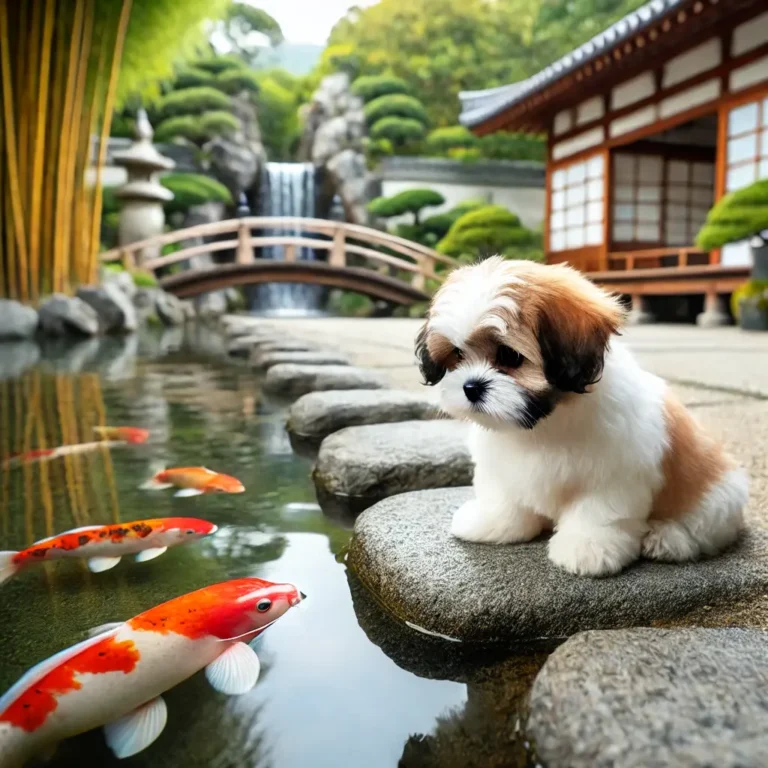Japanese Shih Tzu
Japanese Shih Tzu – A Royal Companion with Timeless Charm
The Japanese Shih Tzu is a rare and elegant hybrid, blending the graceful Japanese Chin with the affectionate Shih Tzu. These small, charming lap dogs are known for their silky coats, expressive eyes, and friendly personalities. They thrive in indoor environments and form strong emotional bonds with their owners, making them ideal companions for families, seniors, and individuals in apartments.
Their calm nature, moderate exercise needs, and gentle demeanor make them suitable for first-time dog owners. Despite their small size, they are alert and intelligent, excelling in obedience and companionship. Their loyalty and loving temperament ensure that they enjoy human company and thrive on affection.
Whether you’re looking for a playful friend or a cuddly lap dog, the Japanese Shih Tzu is a delightful choice. Their adaptable nature, low-maintenance exercise needs, and sweet personality make them a treasured pet for many households.

Adorable Japanese Shih Tzu Puppies – Small Bundles of Joy
Japanese Shih Tzu puppies are tiny balls of fluff, full of energy and curiosity. From an early age, they display affectionate, playful, and social traits, making them excellent family pets. These puppies require early socialization to develop into well-rounded dogs, getting along well with children and other pets.
Their soft, silky coat requires early grooming habits, and gentle training is essential for obedience and housebreaking. While they love to play and explore, they are equally happy curling up on your lap. Their charming personalities, intelligence, and adaptability make them a wonderful choice for pet lovers.
Breed Traits
The Japanese Shih Tzu is a loving, intelligent, and affectionate dog with a silky coat, small size, and a friendly personality. They thrive as companions, preferring human company and indoor living.
The Japanese Shih Tzu has an average lifespan of 12 to 16 years, provided they receive proper care, a healthy diet, and regular vet check-ups. Their lifespan depends on genetics and overall well-being.
The Japanese Shih Tzu typically stands between 8 to 11 inches tall at the shoulder. Their compact and sturdy build makes them ideal for small homes, apartments, and urban environments.
Weighing between 7 to 15 pounds, the Japanese Shih Tzu is a lightweight, small breed. Their size makes them easy to handle, and their low exercise needs suit both young and senior owners.
This breed thrives in indoor environments, making them perfect for apartments and small homes. They enjoy human company, love cuddling on laps, and prefer moderate temperatures to avoid overheating.
Breed Characteristics
The Japanese Shih Tzu is affectionate, intelligent, and playful. They enjoy companionship, gentle training, and indoor play. Their silky coat, compact size, and social nature make them ideal pets for all lifestyles.
This loyal and affectionate breed loves spending time with family. They are gentle with children, friendly with other pets, and form strong emotional bonds, making them great for households of all sizes.
They have a small, compact frame, a silky coat, and expressive round eyes. Their adorable face, floppy ears, and feathery tail give them a charming and elegant appearance.
The Japanese Shih Tzu is highly social and loves being around people. They get along well with children, other pets, and strangers, making them friendly and adaptable in various settings.
They are gentle, loving, intelligent, and playful. This breed enjoys attention, cuddles, and companionship, making them ideal pets for families, seniors, and individuals looking for a loyal companion.
Training the Japanese Shih Tzu – Easy and Rewarding
Training a Japanese Shih Tzu is relatively easy due to their intelligence and eagerness to please. They respond well to positive reinforcement, treats, and gentle guidance. Early house training and socialization ensure they develop good manners.
They enjoy short, engaging training sessions, learning tricks and commands quickly. Since they crave human attention, they excel at obedience and agility training. However, they can sometimes be stubborn, so patience and consistency are key. With firm but gentle training, they become well-behaved, loving companions.
Japanese Shih Tzu History & Facts
The Japanese Shih Tzu is a hybrid breed, resulting from crossing the Japanese Chin with the Shih Tzu. Both parent breeds have a rich history in Asian royal courts, often serving as cherished lap dogs for emperors and nobility.
The Japanese Chin originated in China and Japan, favored by aristocrats for centuries, while the Shih Tzu has Tibetan and Chinese royal heritage. Combining these two breeds resulted in a gentle, intelligent, and affectionate lap dog. Today, they continue to delight owners worldwide with their sweet nature, charm, and loyal companionship.
Their ancestors were once prized pets of Chinese and Japanese emperors.
They have long, luxurious fur that requires regular grooming.
They thrive on cuddles and human attention.
Despite their size, they are sturdy and resilient.
- Their low exercise needs make them perfect for small living spaces.
Popular Shih Tzu Mix Breeds
The Shih Tzu is often crossed with other breeds to create adorable hybrids. Some popular Shih Tzu mixes include:
- Shih Tzu Maltese Mix – Small, affectionate, and playful.
- Shih Tzu Poodle Mix – Hypoallergenic and intelligent.
- Shih Tzu Chihuahua Mix – Lively and full of personality.
- Shih Tzu Yorkie Mix – Tiny, energetic, and loyal.
- Shih Tzu Terrier Mix – Bold and friendly.
These hybrids retain the best qualities of their parent breeds, making them beloved companions worldwide.
Food – Nutritional Needs of the Japanese Shih Tzu
The Japanese Shih Tzu thrives on a balanced, high-quality diet that includes protein-rich meats, whole grains, and vegetables. Their small size and moderate activity level mean they require controlled portions to maintain a healthy weight.
Choose small-breed dog food with essential nutrients, omega fatty acids, and vitamins to support their silky coat, digestion, and overall well-being. Avoid artificial preservatives, excessive fillers, and table scraps to prevent obesity and health issues. Fresh water should always be available, and occasional treats should be given in moderation. Consulting a vet ensures a tailored diet for their specific needs.
Breed Behavior – Understanding the Japanese Shih Tzu’s Personality
The Japanese Shih Tzu is a loving, social, and intelligent breed that thrives in companionship. They are friendly, affectionate, and enjoy human interaction. While playful, they also appreciate calm environments. They do well in families, with seniors, or single owners who provide consistent love and attention.
Alertness
Protectiveness
Prey drive
Aggressiveness
Barking level
Trainability
Mental stimulation needs
Intelligence
Popular Terrier Mix Breeds – Small but Mighty Companions
Terriers are known for their bold personalities and energetic nature. When crossed with a Shih Tzu, the result is an adorable mix of intelligence, playfulness, and companionship. Popular Shih Tzu Terrier Mixes include:
- Shih Tzu Yorkie Mix (Shorkie) – Small, energetic, and affectionate.
- Shih Tzu Jack Russell Terrier Mix – Lively and playful, with high energy.
- Shih Tzu Rat Terrier Mix – Agile, intelligent, and strong-willed.
- Shih Tzu Boston Terrier Mix – Gentle, loving, and loyal.
These hybrids inherit the best traits from both breeds, making them ideal for different types of dog owners.
Grooming – Maintaining the Beauty of a Japanese Shih Tzu
The Japanese Shih Tzu has a silky, flowing coat that requires regular grooming. Daily brushing helps prevent tangles and matting, keeping their fur soft and shiny. A monthly bath using gentle dog shampoo maintains a clean, healthy coat.
Regular eye cleaning prevents tear stains, while nail trimming and ear cleaning should be done weekly. Their hair grows continuously, so trims every 6 to 8 weeks help maintain a manageable coat length. Professional grooming may be necessary for owners who prefer a polished look. With consistent care, they remain beautiful, comfortable, and healthy.
Physical Attributes – The Elegant Build of the Japanese Shih Tzu
The Japanese Shih Tzu is a small, sturdy, and well-balanced dog with a luxurious coat and expressive eyes. They have a compact body, a short snout, and a feathered tail curling over their back. Their silky fur, combined with their graceful movement, makes them an eye-catching and elegant companion.
Breed Size
Colours
Coat
Drooling
Snoring
Exercise Needs
Grooming Needs
Aggressiveness
Health – Caring for the Well-Being of a Japanese Shih Tzu
This breed is generally healthy, but they may experience brachycephalic respiratory issues, eye infections, or dental problems due to their short snout. Regular vet check-ups, a balanced diet, and proper dental hygiene help maintain their health.
They may also be prone to patellar luxation (knee issues), allergies, or hip dysplasia in older age. Keeping their weight in check and ensuring they get gentle exercise can help prevent joint issues. Routine care, vaccinations, and grooming contribute to a long, happy life for these small companions.
Medium Dog Breed – Do They Fit This Category?
While the Japanese Shih Tzu is classified as a toy breed, they can be mistaken for small-medium dogs due to their dense coat and sturdy build. Their weight ranges between 8-15 pounds, which is still within small breed standards.
Unlike traditional medium-sized dogs, they have lower exercise needs and a more compact frame, making them ideal for apartment living. If you’re looking for a breed that has a balanced temperament, is easy to handle, and does not require extensive outdoor space, the Japanese Shih Tzu makes an excellent choice for both small and medium dog lovers.
Japanese Shih Tzu FAQ
Are Japanese Shih Tzus good with kids?
How often should I groom my Japanese Shih Tzu?
Do they get along with other pets?
Are Japanese Shih Tzus hypoallergenic?
How much exercise do they need daily?
Do Japanese Shih Tzus suffer from separation anxiety?
Can they tolerate hot weather?
How long do Japanese Shih Tzus live?
Dog Life – The Daily Routine of a Japanese Shih Tzu
The Japanese Shih Tzu enjoys a relaxed lifestyle, spending most of their day lounging indoors and playing in short bursts. They wake up to morning cuddles, followed by a light walk for exercise.
They love mental stimulation through toys and obedience training, and they cherish afternoon naps in cozy spots. They enjoy human interaction, following their owners around the house. Evenings consist of gentle play, more relaxation, and bedtime cuddles. Their low-maintenance exercise needs and affectionate nature make them a perfect fit for families, seniors, and apartment dwellers.
The Japanese Shih Tzu is a charming, affectionate, and intelligent companion. Their compact size, friendly nature, and moderate exercise needs make them ideal for a variety of lifestyles.
With proper grooming, nutrition, and training, they remain healthy, well-behaved, and happy. Whether you’re looking for a gentle family pet, a loving lap dog, or a low-maintenance breed, the Japanese Shih Tzu is a wonderful choice. Their lifelong loyalty and adorable personality make them a treasured addition to any home. Are you a fierce German Shepherd or a chill Bulldog? Find out now!



























